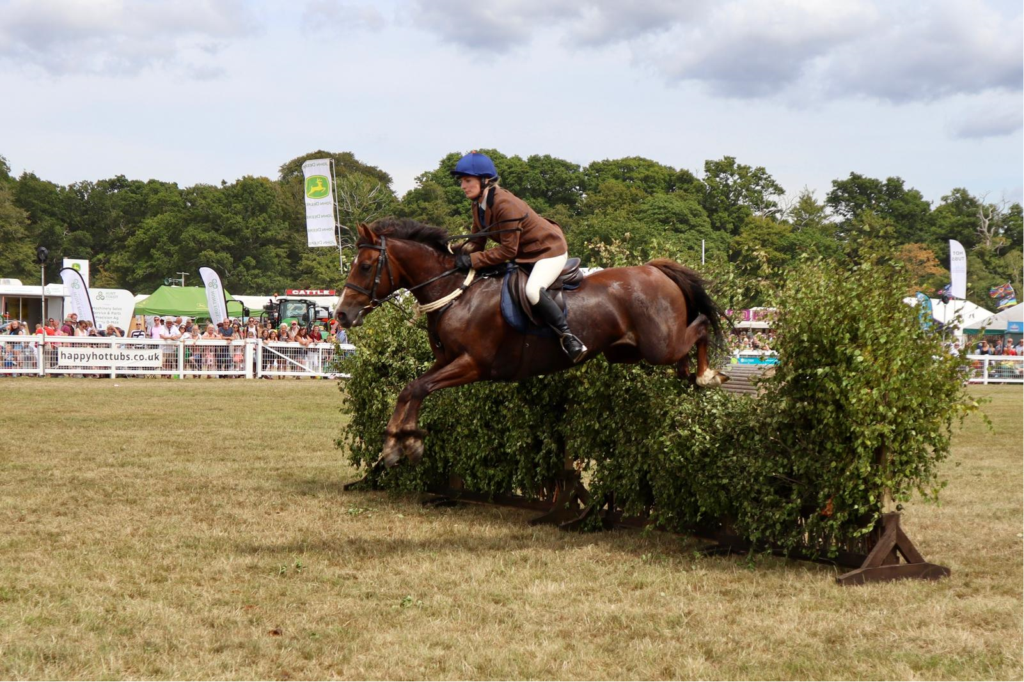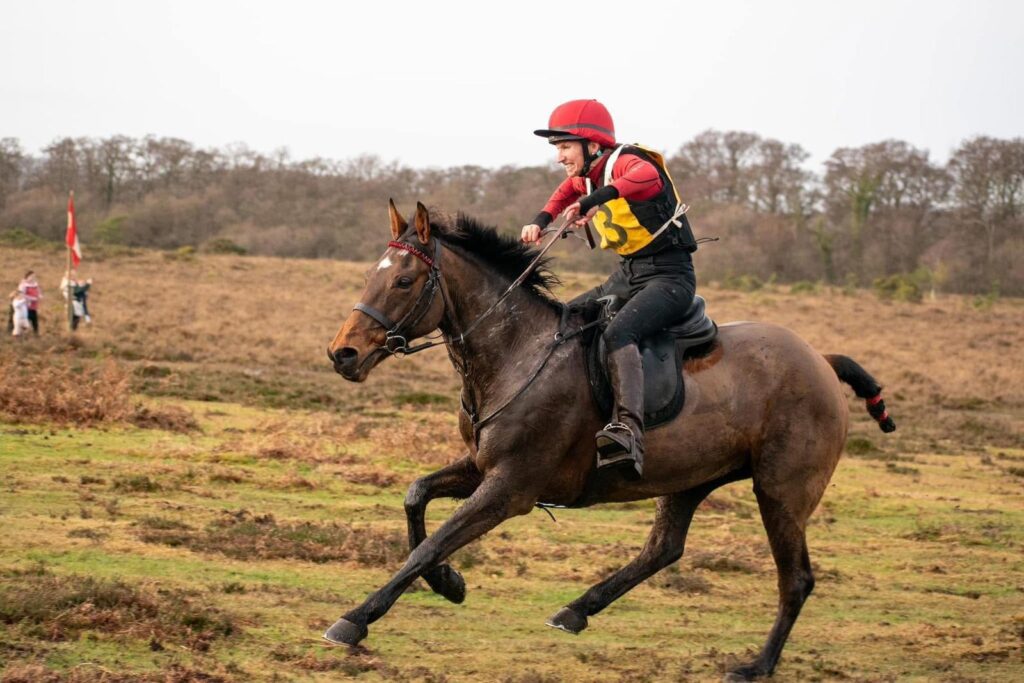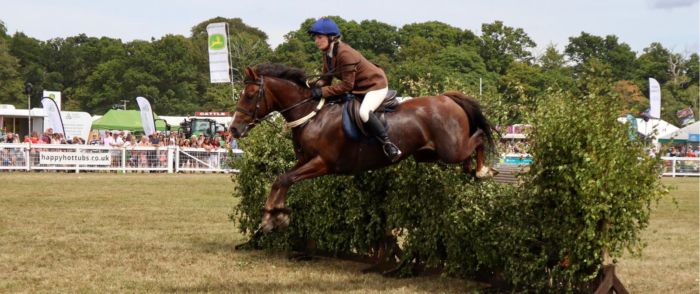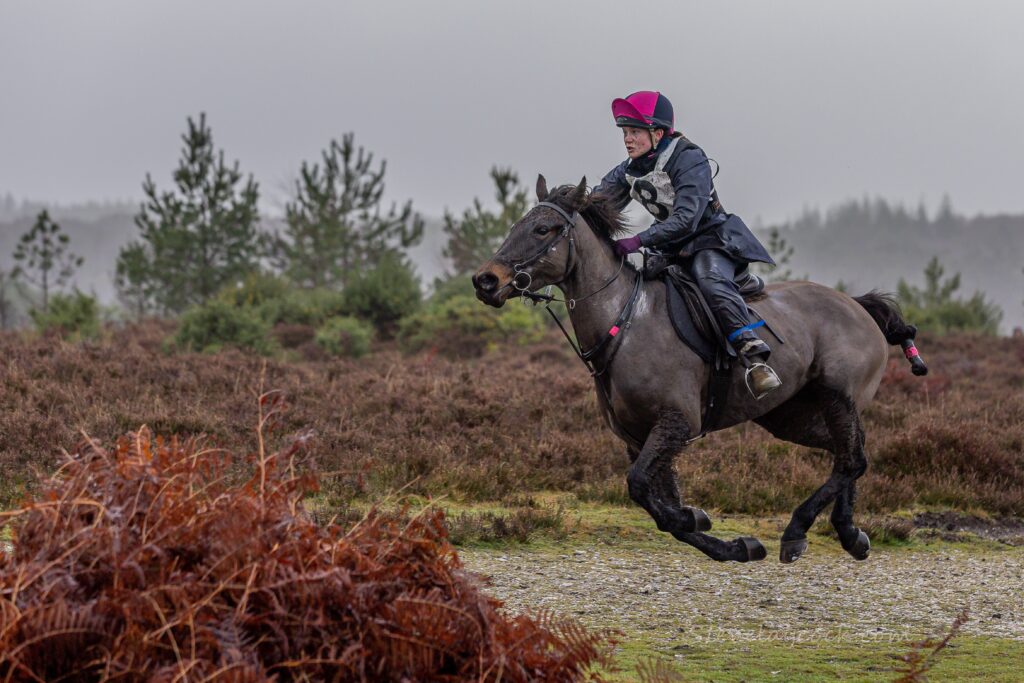Celebrating women in New Forest commoning on International Women’s Day
Saturday, 8 March marks International Women’s Day 2025, which celebrates the social, economic, cultural and political achievements of women across the globe.
We asked three female New Forest commoners – Amy Howells, Daisy Slocombe and Erika Dovey – to share their stories and unique experiences of life in the Forest.
Read their stories below.
“I see both myself and my animals as custodians of this landscape”

Amy Howells, Estates Officer for Forestry England
‘As an estates officer for Forestry England, I provide guidance to residents, parish councils, and other Forest organisations on how to be responsible neighbours within the New Forest. This landscape is internationally important for wildlife, and it is essential that we all play our part in its conservation.
‘My day-to-day work is highly varied. I advise utility companies on how to carry out their operations without damaging the Forest’s special habitats. I work closely with local parish councils and private residents on matters such as appropriate fencing, hedge management, and access rights. I also collaborate with multiple stakeholders to help private property owners understand their boundaries and take action when encroachment occurs. Even small encroachments, such as new fences being erected beyond original boundaries, can significantly impact the grazing livestock and wildlife that depend on this unique landscape. Collectively, these can accumulate, leading to a considerable amount of land being lost.
‘Beyond my role as an estates officer, I am also a commoner, meaning I have the right to turn out animals onto the New Forest. The New Forest is a working landscape where commoning plays a vital role in its cultural heritage and conservation. Without the grazing livestock, the forest would become overgrown, harming the delicate balance of local flora and fauna. As a commoner, I see both myself and my animals as custodians of this landscape. I have a deep connection to nature and feel incredibly privileged to live and work in such a special place.
‘I was fortunate to be born into a commoning family, learning much of my knowledge and skills from my parents and fellow commoners. Commoning is a close-knit community where tasks are often completed collectively, and resources are shared.
‘One of my particular interests as a commoner is the breeding and conservation of the New Forest pony. I am dedicated to developing a small herd that is both hardy and well-suited to life on the forest while also improving genetic bloodlines. A small number of my ponies are sold to become successful riding ponies. While commoning is not a path to financial gain – often resulting in a loss – the satisfaction it brings me far outweighs any material reward. I feel incredibly fortunate to be part of this way of life and hope that others recognise and value the vital role commoning plays in preserving the New Forest.’
“I am incredibly passionate about preserving the cultural heritage of commoning for future generations”
Daisy Slocombe, Chair, New Forest Young Commoners
‘I feel incredibly fortunate to live as a young commoner in the New Forest, there’s no other way of life I’d choose, nor anywhere else I’d rather live. I have a small herd of New Forest ponies who graze the Forest, playing a vital role in preserving the Forest’s cultural heritage and ecology.
‘Commoning isn’t just a hobby or a job; it’s a way of life. Without commoners and their livestock, the New Forest wouldn’t be the place we all know, love, and cherish.
‘Being part of the commoning community is unique. The connections you build go beyond friendships, they become an extended support network. While I have strong friendships from school and elsewhere, the relationships within the forest run deeper. We share the same passion, way of life and commitment.
‘I have been part of the Young Commoners’ committee since I was 17 and feel privileged to have worked my way up to chair. I am incredibly passionate about preserving the cultural heritage of commoning for future generations. Ensuring that young commoners have better access to maintain this way of life is something I am deeply committed to, and as chairwoman, I strive to make that a reality.
‘Thanks to my extended family, I was introduced to my beloved New Forest pony, Betty (pictured). We were quite the ‘girl power duo.’ The bond between a pony and rider is so important, both must have equal trust in one another. Betty taught me how to be resilient, brave, strong and that superglue is often needed!
‘Although a little quirky at times, Betty had the qualities an ideal New Forest pony should have; the hardiness, strength, stamina and she was incredibly sure footed when galloping over rough ground. Together, we participated in every drift, hunted with the New Forest Hounds, raced in the New Forest Point to Point and assisted with the New Forest agisters.
‘Having a versatile pony is so important when being a commoner. Betty was happy to go for a steady mooch checking stock but then happy to fly across the bracken and ditches when after a mare and foal. I am now starting a new adventure with Betty’s niece; Rowdown Dior.
‘Dior was specifically bred to continue a long line of Forest stock that’s known for its hardiness and speed which is becoming increasingly rare, and a line we would like to maintain. Maintaining rare bloodlines is imperative for the breed and the future of the New Forest pony.
‘Life as a New Forest commoner is special and unique. I have travelled the world, swam in the bluest of seas, seen the most amazing sunsets and camped in the Australian outback, yet still my favourite place on this planet is Woodfidley (near Beaulieu Road) – there’s no place like home – especially this one!’
“There is no greater feeling seeing my stock out on the Forest”
Erika Dovey, New Forest National Park Authority ranger

‘I work as a ranger for the New Forest National Park Authority, helping to provide people with information about the New Forest and how they can enjoy it responsibly. I work as part of a team of rangers, and you’ll often see us out and about in our mobile unit. We talk with people about the impacts of their visit and how they can help care for this precious landscape and the wildlife it supports.
‘I am also a commoner, and am proud to graze my animals here as part of an ancient tradition dating back to 1217. Only a certain number of properties retain these rights over the Forest, first laid out in the Charter of the Forest (1217).
‘The Forest is a working landscape, and I mentor other new and young commoners to help this ancient tradition to continue.
‘I have always lived in the New Forest and am a farmer’s daughter alongside having the commoning tradition handed down. I became a ranger for the NPA through experience of living, working and volunteering in the Forest.
‘I am extremely proud of being a commoner and am passionate about helping others get into the practice. While it comes with its challenges, it is intrinsically linked to my heritage and is very much a way of life; one I wouldn’t swap for anything else.
‘There is no greater feeling seeing my stock out on the Forest, and riding like my father and grandfather used to do gives me immense pride. I am privileged to be able to continue this way of life and the traditions that go alongside it.’

Members Login
 Latest Tweets
Latest Tweets
Follow us
@realnewforest 4h
Icilibus sam quas aut eriatem nume corepta auta conet officaborem quodi corepta auta conet officaborem quodi apernat ectlpa dolorpiaecus.
@realnewforest 4h
Icilibus sam quas aut eriatem nume corepta auta conet officaborem quodi corepta auta conet officaborem quodi apernat ectlpa dolorpiaecus.
@realnewforest 4h
Icilibus sam quas aut eriatem nume corepta auta conet officaborem quodi corepta auta conet officaborem quodi apernat ectlpa dolorpiaecus.
With thanks for support from





